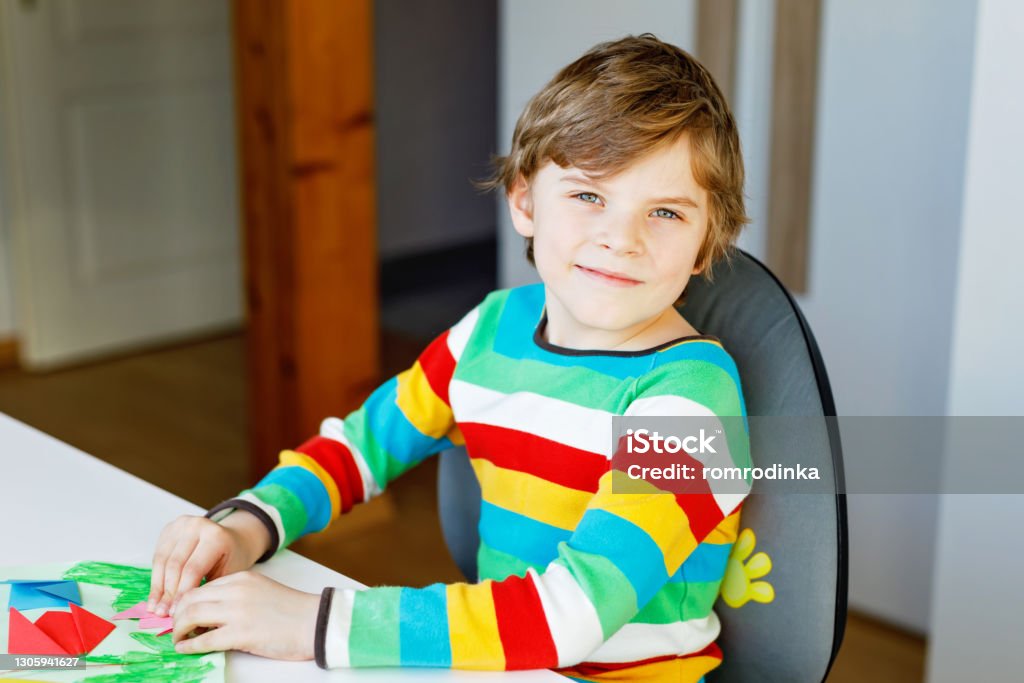
Welcome to 'Soothing Paper Folds: Top 10 Anxiety-Relieving Origami Activities for Children.'
In this article, we explore the therapeutic benefits of origami and how it can help children find calm amidst anxiety.
With a focus on promoting emotional well-being, our curated selection of origami activities aims to unleash creativity, foster resilience, and spread serenity through the art of paper folding.
Join us as we delve into the world of mindful origami and discover the power of this ancient practice.
Mindful Origami: Finding Calm Through Paper Folding
One effective way to cultivate mindfulness and achieve a sense of calm is through engaging in a few carefully selected origami activities. Origami, the art of paper folding, offers a unique opportunity to find focus and improve concentration.
When you embark on an origami project, your mind becomes fully absorbed in the task at hand. The precise folds and intricate designs demand your complete attention, allowing you to enter a state of flow where worries and distractions fade away. As you navigate through the steps, your concentration deepens, and your mind becomes more attuned to the present moment.
The repetitive and rhythmic nature of folding paper can have a soothing effect, helping to calm a restless mind and promote relaxation. By practicing mindful origami, you can discover a pathway to inner peace and serenity.
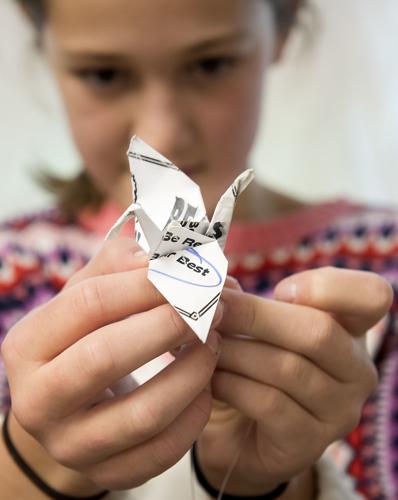
Relaxation Through Origami: Stress-Relief Techniques for Kids
The utilization of specific origami techniques can provide children with effective stress-relief and relaxation methods. Origami, the art of paper folding, has been known to promote mindfulness and calmness in individuals of all ages. For children, it can be an excellent tool for stress reduction and anxiety management.
Here are three stress-relief techniques that children can explore through origami:
Deep breathing origami: Encourage children to take slow, deep breaths while folding the paper. This helps calm the nervous system and promotes relaxation.
Mindful folding: Teach children to focus on the present moment while folding the paper. Engaging in the process and paying attention to the details can help distract from anxious thoughts.
Guided origami sessions: Provide children with step-by-step instructions or video tutorials to follow. This can instill a sense of accomplishment and boost confidence, leading to reduced stress levels.
Origami provides a creative outlet for children to express themselves while also offering a practical way to manage stress and anxiety.
Origami for Tranquility: Creating Peaceful Paper Creations
Creating peaceful paper creations through origami can bring a sense of tranquility and serenity to individuals of all ages. The art of origami allows us to connect with our inner selves, find solace in the simplicity of folding paper, and create beautiful animals that symbolize peace.
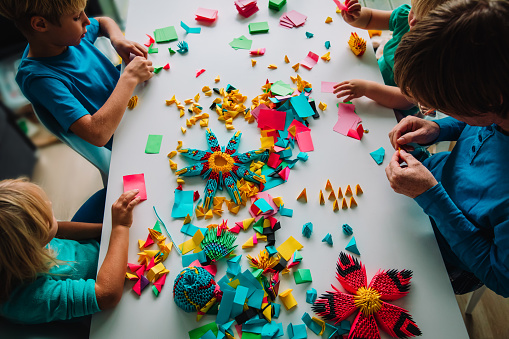
Origami animals, such as cranes and turtles, have long been associated with calmness and harmony. The meditative nature of origami makes it a perfect tool for relaxation and stress relief. As we focus on the precise folding of each crease, our minds become fully absorbed in the present moment, leaving behind worries and distractions.
Through the practice of origami, we can find a peaceful escape from the chaos of everyday life and embrace a moment of freedom and tranquility.
Therapeutic Origami: Soothing the Mind With Folded Art
Origami has proven to be a therapeutic practice that promotes mental well-being through the art of folding paper. The soothing art therapy of origami offers a range of benefits, including stress reduction, increased focus, and improved mindfulness.
Here are three calming craft activities that can soothe the mind and provide a sense of tranquility:
Mindful Folding: Engage in the meditative process of folding paper, focusing on each crease and fold. This activity helps to quiet the mind and bring a sense of calm.
Symbolic Creations: Create origami designs that hold personal meaning or represent emotions. This allows for self-expression and reflection, offering a therapeutic outlet for emotions.
Group Origami: Engage in origami with others, fostering a sense of community and connection. This shared experience can provide comfort and support, enhancing the therapeutic benefits of origami.
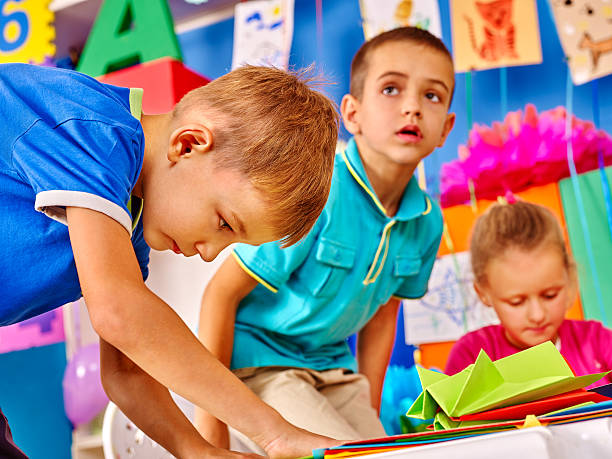
Within the realm of therapeutic practices for children, origami serves as a valuable tool in promoting emotional well-being.
Origami not only engages children in a calming and creative activity, but it also promotes mindfulness and fosters their creativity.
When children engage in origami, they are encouraged to focus on the present moment, which helps them develop a sense of mindfulness and awareness of their emotions.
The repetitive and rhythmic folding motions can have a soothing effect on their minds, allowing them to relax and let go of stress and anxiety.
Additionally, origami allows children to express themselves artistically and explore their imagination, boosting their self-esteem and providing an outlet for self-expression.
Origami for Anxiety: Channeling Worries Into Paper Folds
Origami can be a powerful tool for managing anxiety in children. It allows them to channel their worries into the process of folding paper. The therapeutic benefits of origami include promoting mindfulness and providing a calming and focused activity that can help alleviate anxiety.
Therapeutic Benefits of Origami
Research has shown that the act of folding paper into intricate shapes can have a therapeutic effect on individuals experiencing anxiety. Origami, the Japanese art of paper folding, offers numerous therapeutic benefits that can promote emotional well-being.
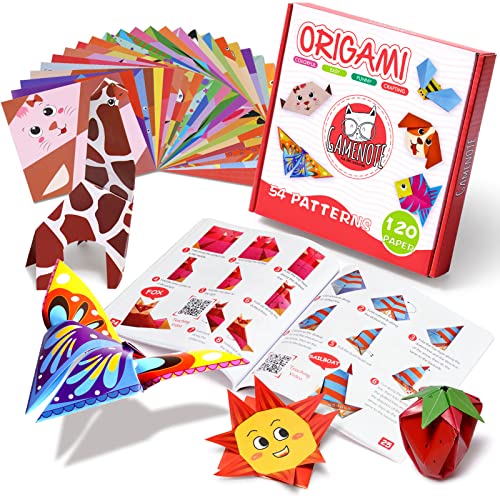
Here are three ways in which origami can help channel worries into paper folds:
Mindfulness: Engaging in origami requires focus and concentration, helping individuals to be fully present in the moment. By diverting attention to the intricate folds and precise movements, anxiety can be temporarily set aside.
Relaxation: The repetitive motions involved in origami can induce a state of relaxation. Folding paper in a calm and controlled manner can help regulate breathing, slow down heart rate, and reduce muscle tension.
Creativity and self-expression: Origami allows individuals to express their emotions and thoughts through the creation of unique and personalized paper designs. This creative outlet can provide a sense of accomplishment and empowerment, fostering a positive mindset.
Mindfulness Through Paper Folding
Practicing mindfulness through paper folding can help individuals with anxiety channel their worries into the soothing art of origami. The act of focusing on the intricate folds and precise movements required in origami promotes a sense of calm and concentration, allowing individuals to redirect their thoughts away from their anxieties.
By immersing themselves in the process of folding paper, individuals can cultivate patience as they gradually transform a simple sheet into a beautiful creation. The repetitive nature of origami can also provide a meditative experience, allowing individuals to quiet their minds and find a sense of peace.
Mindfulness through paper folding offers a unique way to engage with one's anxiety, transforming it into a creative outlet that promotes focus and cultivates patience.
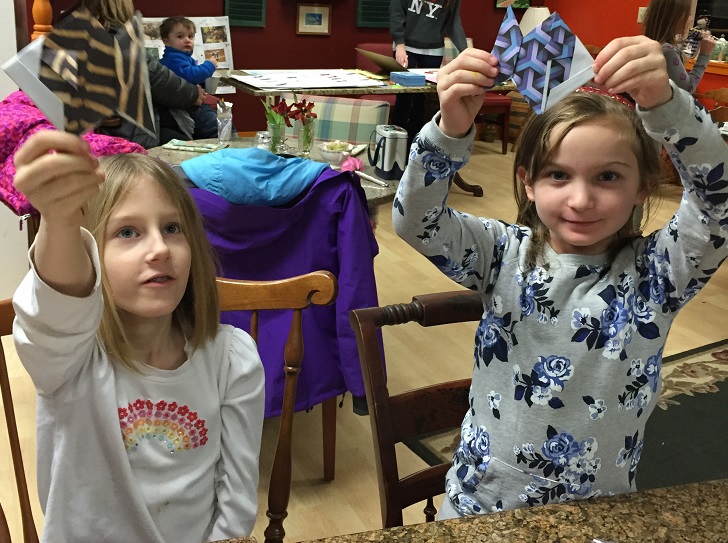
Origami for Relaxation: Unwinding With the Art of Paper Folding
The art of paper folding, known as origami, offers a calming and meditative experience for individuals seeking relaxation. Whether you're looking for a way to unwind after a long day or simply want to find a moment of peace in your busy schedule, origami can be a powerful tool in your relaxation arsenal.
Here are three ways origami can help you unwind and find tranquility:
Focus on the present: Origami requires your full attention and concentration, allowing you to escape from the worries of the past or future and be fully present in the moment.
Mindful movement: The rhythmic and deliberate folding of paper engages your hands and mind, providing a soothing and repetitive motion that can help calm your thoughts and release tension.
Creative expression: Origami allows you to tap into your creativity and explore different folding techniques, giving you a sense of freedom and self-expression that can be deeply satisfying and relaxing.
Stress Relief Through Origami: Unleashing Creativity and Calm
Origami not only provides stress relief, but it also allows individuals to tap into their creativity and find a sense of calm.
The therapeutic benefits of origami are numerous, as the repetitive folding motions can help enhance mindfulness and promote a state of relaxation.
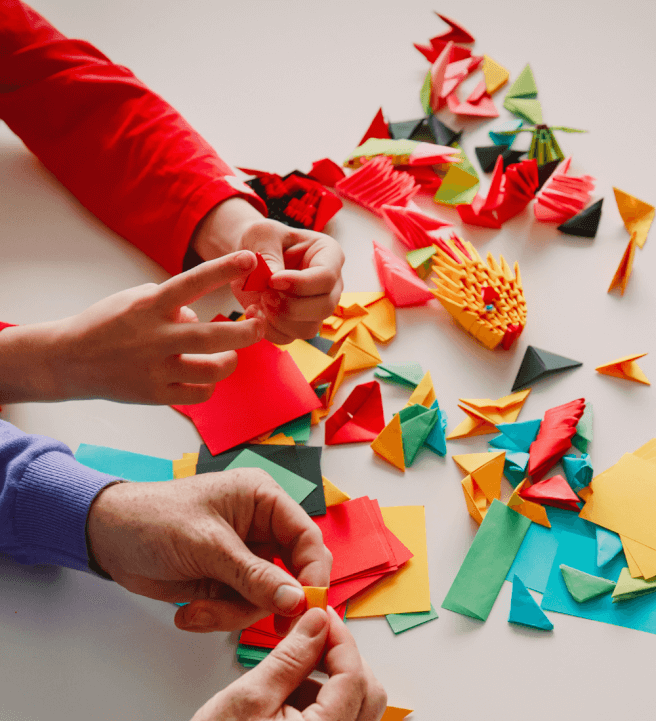
Therapeutic Benefits of Origami
One of the key benefits of engaging in origami is the ability to unleash creativity and promote a sense of calm through the act of folding paper. Origami has been found to have therapeutic benefits, promoting well-being and providing a much-needed escape from the stresses of daily life.
Here are three ways in which origami can help foster a sense of peace and tranquility:
Mindfulness: When practicing origami, individuals are encouraged to focus on the present moment and pay attention to the intricate details of each fold. This mindfulness practice can help reduce anxiety and bring a sense of peace.
Relaxation: The repetitive and rhythmic motions of folding paper can induce a state of relaxation, similar to the effect of meditation or deep breathing exercises. It can help lower heart rate, reduce muscle tension, and alleviate stress.
Self-expression: Origami allows individuals to express their creativity and imagination. It provides a safe space for exploration and experimentation, promoting a sense of freedom and self-discovery.
Engaging in origami can be a powerful tool for achieving inner calm and finding solace in a chaotic world.
Enhancing Mindfulness Through Folding
Engaging in mindfulness through the art of folding paper can enhance one's sense of calm and promote a state of relaxation. This practice combines the calming nature of origami with the mindful creativity of the individual, resulting in a truly therapeutic experience.
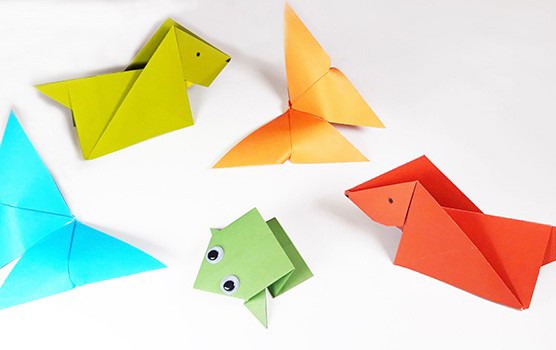
When we engage in folding paper mindfully, we focus our attention on the present moment, allowing our worries and anxieties to fade away. The repetitive and precise nature of folding helps to quiet the mind and bring about a sense of peace.
By immersing ourselves in these calming crafts, we can tap into our creativity and find solace in the simple act of folding paper.
Origami for Emotional Wellness: Building Resilience Through Folding
Developing emotional resilience can be fostered through the therapeutic practice of origami folding. Origami is not only a creative and calming activity but also a powerful tool for promoting emotional well-being.
Here are three ways origami can help build resilience:
Focus and mindfulness: Origami requires concentration and attention to detail, which can help children develop focus and mindfulness. By immersing themselves in the folding process, they can temporarily escape from their worries and anxieties.
Problem-solving skills: Origami involves following instructions and figuring out complex folding patterns. This challenges children to think critically and find solutions, enhancing their problem-solving skills. Overcoming obstacles in origami can boost their confidence and resilience.
Patience and perseverance: Origami is a patient art form that requires practice and repetition. By persisting through difficult folds and mistakes, children learn the value of patience and perseverance. This resilience can be translated into other areas of their lives, helping them overcome challenges and bounce back from setbacks.
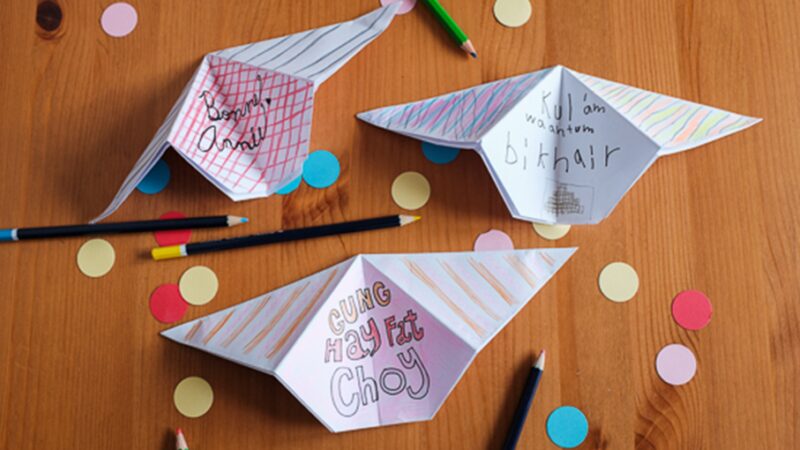
Origami folding provides a therapeutic outlet for building resilience and promoting emotional well-being in children. By engaging in this ancient art, they can discover their inner strength and develop coping mechanisms that will serve them throughout their lives.
Origami for Peace: Spreading Serenity With Paper Folds
To promote peace and serenity, origami can be utilized as a tool for spreading tranquility through the intricate folds of paper. Origami for meditation is a practice that promotes inner peace through the art of paper folding.
The repetitive and focused nature of origami allows individuals to enter a state of mindfulness, where they can find solace and quietude. As the paper gracefully transforms from a flat surface into a three-dimensional creation, the mind also undergoes a transformation, leaving behind worries and stress. The act of folding paper becomes a metaphor for letting go and finding inner peace.
Through origami, individuals can cultivate a sense of calmness and tranquility, promoting a peaceful state of mind both within themselves and in the world around them. Let the folds of paper carry you to a place of serenity and harmony.
Frequently Asked Questions
How Long Does It Typically Take to Complete an Origami Project?
The average completion time for an origami project can vary depending on the complexity of the design and the skill level of the individual. However, beginner-friendly designs typically take around 15-30 minutes to complete.
What Type of Paper Is Best for Origami?
When it comes to origami, the choice of paper is crucial. There are various origami paper options available, but it is recommended to use paper with a thickness of around 70-90 gsm for best results.
Are There Any Health Benefits Associated With Practicing Origami?
Origami offers a range of health benefits, making it an effective form of therapy for adults. It enhances cognitive skills, reduces stress and anxiety, improves hand-eye coordination, and promotes relaxation and mindfulness.

Origami therapy benefits are not limited to children; it can also be used as a form of therapy for adults. By using origami techniques for stress relief, adults can experience the calming and meditative effects of this art form.
Are There Any Specific Origami Techniques That Can Help With Anxiety Relief?
Origami techniques can indeed be helpful in relieving anxiety. By engaging in the mindful and repetitive practice of folding paper, individuals can experience a sense of calm and focus, making origami a valuable tool in therapeutic settings.
 Kids Art ProjectsParty PlanningPaper CraftsOrigami for KidsPrivacy PolicyTerms And Conditions
Kids Art ProjectsParty PlanningPaper CraftsOrigami for KidsPrivacy PolicyTerms And Conditions
